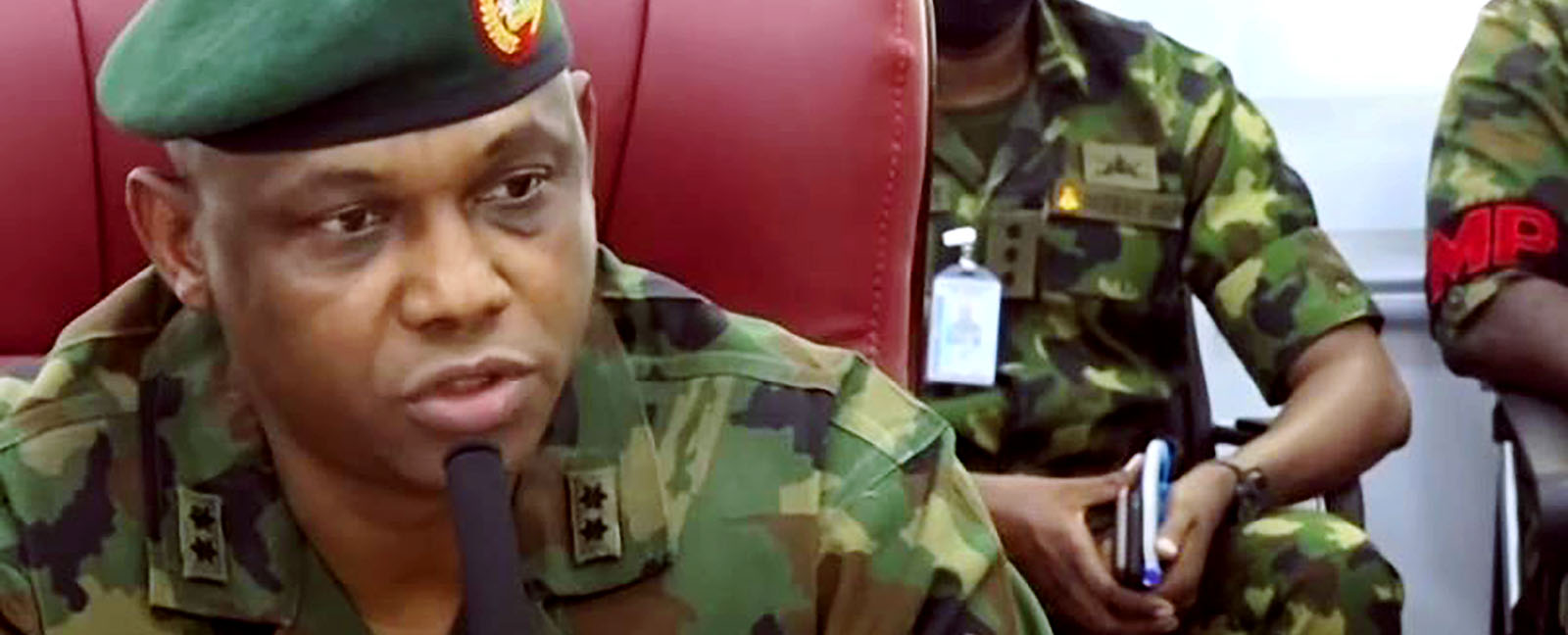
A Nigerian General speaks at the Division Headquarters during a visit of the Senate Committee on Army. (Photo: TVC News Nigeria)
Across Africa, security forces, including the army and the police, possess varying levels of professionalism. In countries where it is lacking, the costs are high—persistent instability, vulnerability to malign external actors, chronic poverty, deferred investment, and stunted democratization. Weak military professionalism is evident in news accounts from the continent—military coups, militaries collapsing in the face of attacks by irregular forces, corruption, looting, and human rights abuses, among others.
“Not playing the sovereign role that is ours as a committee and as a parliament would amount to giving the government carte blanche.”
On average, African countries spend 6 percent of their national budgets on the defense sector. Yet, these expenses are often opaque and poorly overseen. Such support, therefore, represents an important investment on the part of African taxpayers, beyond the security implications they entail.
The Africa Center for Strategic Studies spoke to the Honorable Bertin Mubonzi, President of the Committee on Defense and Security of the National Assembly of the Democratic Republic of the Congo (DRC) as well as President of the Network of African Parliamentarians Members of Defense and Security Committees to explain the role of parliaments and parliamentary committees in holding the security sector accountable.
* * *
Why are parliaments and parliamentary committees so important for the governance, oversight, transparency, accountability, legitimacy, and effectiveness of the security sector?
Our role is important because, on the most basic level, not playing the sovereign role that is ours as a committee and as a parliament would amount to giving the government carte blanche.
First and foremost, parliament has an obligation to provide institutions sufficient means to implement the government’s policies. But parliament also then has the obligation to control how these means are put to use and to ensure, in the case of the security institutions that we oversee, that things are being done to guarantee the security not only of our borders but also of the population we represent at the level of the National Assembly.
What is the specific role of defense committees in the construction of a legitimate and accountable security sector? How do such committees improve the effectiveness and professionalism of the security sector and citizen security?
The role of the Committee on Defense and Security and of its president is similar to that of the Minister of Security and Defense, at the level of the National Assembly. It is a role that implies the development of the budget and management, as well as oversight and control of expenditures and activities. The work of the Committee is sent up to the Bureau of the National Assembly so that it can then be examined in plenary session, with all the other members of parliament.
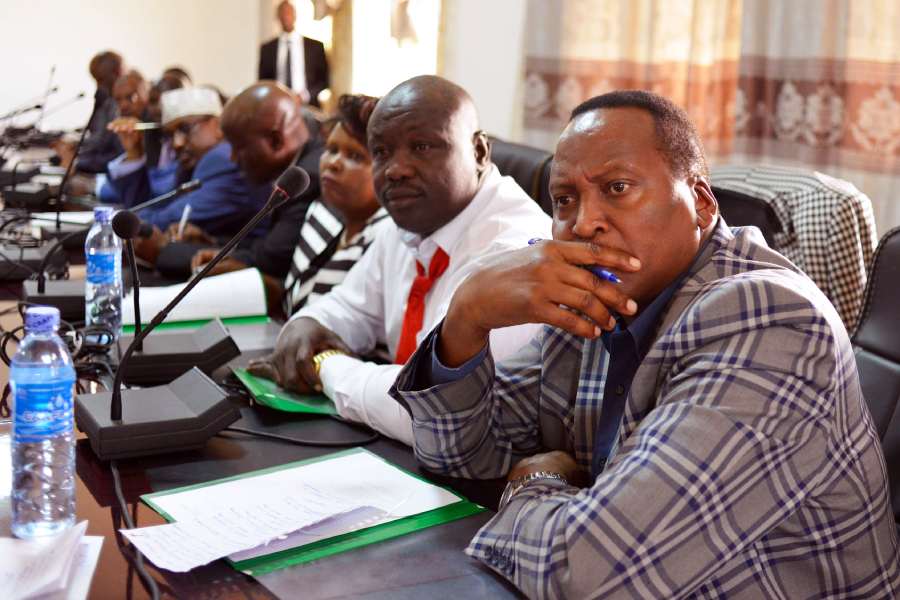
A meeting of the Kenyan and Somali Parliamentary Defence Committees. (Photo: AMISOM/Omar Abdisalam)
One of the most important roles of the Committee and of parliament is to vote for the government’s budget. But, before a vote at the level of the Defense Committee, we have meetings with all the participants in the security and defense sector. So, for example, the Committee and its president meet with the budget teams for the army, the police, the department of immigration, but also the intelligence services. This allows us to gather their requirements and needs, together. Of course, they bring their own budgets to these meetings. Then, with colleagues from the Financial and Economic Committee, which handles the budget, we work to harmonize matters so that we can come out with a budget to allocate to the defense and security sector. Thus, this year, our work allowed us to double the defense budget. This work was done at the level of the National Assembly.
Second, in our national budget, which is not very large, it is very difficult to account for the entirety of the security sector’s needs. So, at the level of the Committee, and with the Minister of Defense, we worked on developing a special budget code for defense. And we decided to begin using two means of funding this mechanism: first, with donated funds from friendly countries and, second, by levying funds on the taxes we have in our country. This will allow us to have additional budgetary funds that do not necessarily depend on the DRC’s national budget.
What are the practical means by which parliamentary oversight of defense expenditures contribute to a more accountable and effective security sector?
Our parliament has several means of obtaining information, overseeing, and holding accountable the security sector’s leadership.
Oversight occurs through parliamentary inquiries and committees of inquiry. Parliamentary inquiries allow us to ask questions of the relevant ministers, including the Minister of Defense or the Minister of the Interior. They can therefore clearly tell us how they are managing the budget we placed at their disposal.
“Before a vote at the level of the Defense Committee, we have meetings with all the participants in the security and defense sector. … This allows us to gather their requirements and needs, together.”
The second means of control for a parliament is the committee of inquiry. In addition to my role as president of the Parliamentary Committee on Defense and Security, I lead a committee established by the National Assembly’s Bureau to investigate the Congolese government’s defense fund. This committee is attempting to answer the following questions: Is this fund being used as it should be to allow our army, our police, and all the security sector actors, to function in such a manner as to guarantee our country’s peace and security?
This committee was established because we unfortunately received information detailing the diversion of funds amidst the chain of command of the army and of other security services. Indeed, sometimes we allocate funds and senior officers use them for their own purposes. Then, in the end, the soldier who is serving on the front lines, has nothing.
So, this committee of inquiry’s objective is to dismantle the criminal networks that exist in the security and defense sectors, at the level of the army, the police, and all the other services. Indeed, parts of the security forces have been implicated in the trafficking of minerals. Some are also accused of supporting rebel groups and of committing serious human rights abuses. But dismantling these networks will be possible only if we are in possession of all the evidence, and if we have of the support of the commander in chief, the President of the Republic, who wants to see things evolve in a positive fashion.
This important work is also very sensitive because some officers have become accustomed, with time, to helping themselves. So, when a committee arrives to stop this, identify the responsible individuals, and sanction them, prudence is required, and we must ensure our own safety.
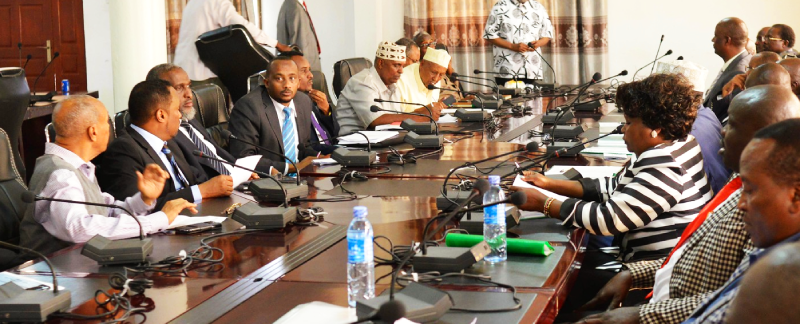
Kenyan Parliamentary Defence Committee members participate in discussions during a meeting with their Somali counterparts. (Photo: AMISOM/Omar Abdisalam)
But these committees of inquiry produce concrete results: indeed, when a soldier knows that the eye of the parliament is watching him—and when you say parliament, that in fact means the people—so when the eye of the parliament watches their actions, there is something of a filter. They control themselves. If there were no oversight and if they knew they were free to do as they pleased, it would be a huge mess. We would have no results in the field of security. So, it is this control, this oversight, that contributes to improving the performance, effectiveness, and accountability of the security sector.
These failures are another reason why we are also working hard to reform the security sector. The chain of command must be truly filtered and aired out.
Very recently, I organized a large training for all police officers on values, which was supported by an international organization.
What lessons can be drawn from the Congolese experience on the role of parliamentary committees in the oversight of the sector? What lessons can be drawn in the creation and operation of these committees?
When you are given such a function, in terms of responsibility, it requires a certain wisdom. I manage issues that pertain to the sovereignty of the Republic as well as the security of my country. Therefore, there are things I cannot say or do. It’s often complicated, and one remains a politician nevertheless, whether from the majority or the opposition. This can become complicated when some parliamentarians share information in public that is supposed to be top secret. Sometimes, members of the committee who are in the opposition, come to meetings and have access to sensitive information. And sometimes, they cannot keep things to themselves. We hear them giving radio interviews and saying horrible things in public. To manage this, I must sometimes tell my colleagues to leave their cellphones outside and I must take back the documents we are working on at the end of the meeting.
“It is this parliamentary control, this oversight, that contributes to improving the performance, effectiveness, and accountability of the security sector.”
The lesson to draw here is that we must learn to take ownership of the electoral process in Africa. When you select your representatives, you must choose the best among us. When people arrive in parliament, they must be people who want results and who, at a certain point can be held accountable and who can tell you “Look, since you sent me there, here is what I have done and accomplished.”
Otherwise, you may end up with a committee on defense and security that has a president, but then there is nothing. He is there and he waits for his term to end.
Are there ways for soldiers, if they feel they are subject to more oversight, to report if they aren’t paid or if equipment they were promised did not arrive?
You know, soldiers work according to orders. Everything they do is based on “yes, Sir!” So generally, with this perspective on discipline, they don’t complain. That’s a problem. But perhaps we could create an open phoneline that soldiers could call to report abuses. I think this would be a first in the Democratic Republic of the Congo. The idea would require approval. But then, they could call and say, “I’m here and it’s been 3 months since I’ve been paid, or 2 weeks since I’ve had something to eat.” Otherwise, for now, they do this very discreetly. My telephone is like a call center with calls from everywhere. It’s possible to make a quick, fully confidential, report.
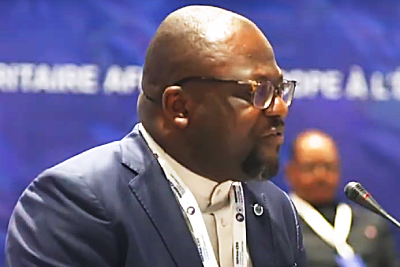
Bertin Mubonzi addressing the annual meeting of REPAM-CDS. (Image: b-one TV Congo)
Prior to my return to Kinshasa, I’ve already written to the Bureau of the National Assembly to request that the Committee on Defense and Security visit military camps. We must see how the families of soldiers deployed to the front lines are living. Indeed, I don’t see how a soldier who is serving on the front lines could be comfortable knowing that his wife and children are not being taken care of by the Republic, be it for school, medical care, food, etc. It would be real progress to be able to say after we have made an official visit, “Parliament came to see how we are living.” We will certainly see horrible problems. But it will allow us to know what is doable to remedy them and to properly take care of these families.
What are the needs, in terms of training, of parliamentarians and their staffs?
The presidents and members of defense and security committees would benefit from specific training in this domain which would permit them to do their job as required. They could, for example, participate in an academic program of the type the Africa Center conducts. Or they could be named to attend a course at the Collège de hautes études de stratégie et de défense in Kinshasa, where I benefited from attending a course, and from which all officers who are promoted to general must now graduate. This type of training would be very useful.
For their staff, these needs explain why I also organized the training of all the administrative staff of the parliament. MONUSCO provided the training for the staffers who manage the Committee’s archives and support its activities. This training, and the certificate they received, builds professionalism and a certain pride to be a professional in your sector.
You are also the president of the Network of African Parliamentarians Members of Defense and Security Committees (REPAM-CDS). What is the role and objectives of this network? How does the network contribute to improved governance and oversight of the security sector?
The REPAM-CDS is an African forum for debate on defense and security issues on the continent. It was established around 5 years ago and now has 26 member countries.
- Strengthen the capacities of parliamentarians in the field of democratic control of the defense and security forces, the fight against terrorism, civil protection, immigration, the arms trade, the fight against the proliferation of small arms and light weapons, etc.
- Establish cooperation and maintain a permanent dialogue between parliamentarians to benefit from good practices through an exchange of experiences.
- Establish cooperation and maintain a permanent dialogue with national and international institutions in charge of the defense and security sector, the regulation of the arms trade, international and regional mechanisms to combat the illicit proliferation of small arms and light weapons, defenders of human rights and all actors and partners interested in the issue of democratic control of the defense and security forces.
- Contribute to the awareness of the population, to the building of trust, and to strengthening the civil-military link in African countries.
- Contribute, through permanent consultation, to the strengthening of actions for the efficient implementation of treaties and laws on terrorism, the arms trade in Africa, etc.
- Monitoring and evaluations of national defense and security policies.
We had realized that security problems are almost all the same across the continent. Then, the language that parliamentarians use is very different to that of governmental policies. So, this network gives us the opportunity to talk to each other, as parliamentarians. And we can understand each other. We also can influence our own country’s policies on security and defense issues.
What are some of the main lessons that the REPAMS-CDS has observed in Africa?
Each time we meet, we discuss, and we manage to get to the bottom of issues and solve problems between states. When we meet between fellow presidents of defense and security committees of neighboring countries, we begin a parliamentary diplomatic effort, a lobby of sorts, to find solutions. The process for managing the network is formal since it includes not only parliamentarians but also the offices of the president, the prime minister, the ministers, etc.
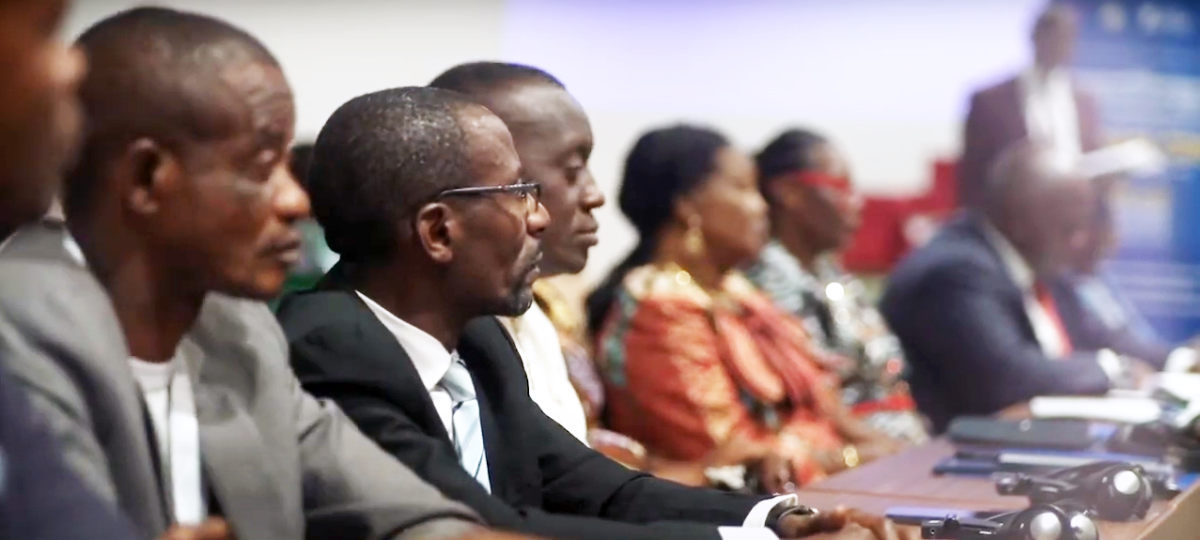
Participants at the 6th conference of REPAM-CDS in October 2022. (Image: b-one TV Congo)
If the president later visits the country, accompanied by the members of the committees, decisions can be made to solve a problem. So, the impact we have is also at the level of relations between states.
Very recently, we received the president of France’s defense parliamentary committee. I took the opportunity to meet with him to discuss the notification requirement of the arms embargo, the discontinuation of which France had just vetoed. I had a very frank meeting with him, with France’s ambassador to the DRC, and then with both ministers of defense. Afterwards, France officially clarified its position. The notification requirement was lifted. We are now free to purchase military equipment with no problem.
Our work is diplomatic but it also contributes to increased oversight of the security sector.
Additional Resources
- Africa Center for Strategic Studies, “Deepening a Culture of Military Professionalism in Africa,” Spotlight, December 20, 2022.
- Africa Center for Strategic Studies, “Professional Military Education Institutions in Africa,” Infographic, February 25, 2022.
- Risa Brooks, “Beyond Huntington: US Military Professionalism Today,” Parameters 51, no. 1 (2021).
- Joseph Siegle, “Africa’s Coups and the Role of External Actors,” Spotlight, Africa Center for Strategic Studies, December 17, 2021.
- Steve Maguire, “Professional Military Education Needs Reform. Here’s Why and What to do,” Wavell Room, October 13, 2021.
- Pat Paterson, “Measuring Military Professionalism in Partner Nations: Guidance for Security Assistance Officials,” Journal of Military Ethics 18, no. 2 (2019).
- Kwesi Aning and Joseph Siegle, “Assessing Attitudes of the Next Generation of African Security Sector Professionals,” Africa Center Research Paper 7, Africa Center for Strategic Studies, May 2019.
- Abel Esterhuyse and Benjamin Mokoena, “The Need for Progress in an Era of Transformation: South African Professional Military Education and Military Effectiveness,” Stability: International Journal of Security & Development 7, no. 1 (2018).
- Hubert de Reviers, “L’École de Guerre et la formation des élites militaires,” Revue Défense Nationale No. 798 (2017).
- Emile Ouédraogo, “Advancing Military Professionalism in Africa,” Africa Center Research Paper 6, Africa Center for Strategic Studies July 2014.
More On: Security Sector Governance Democracy

